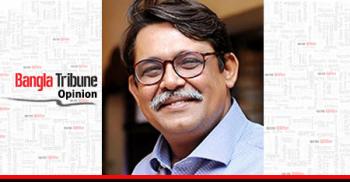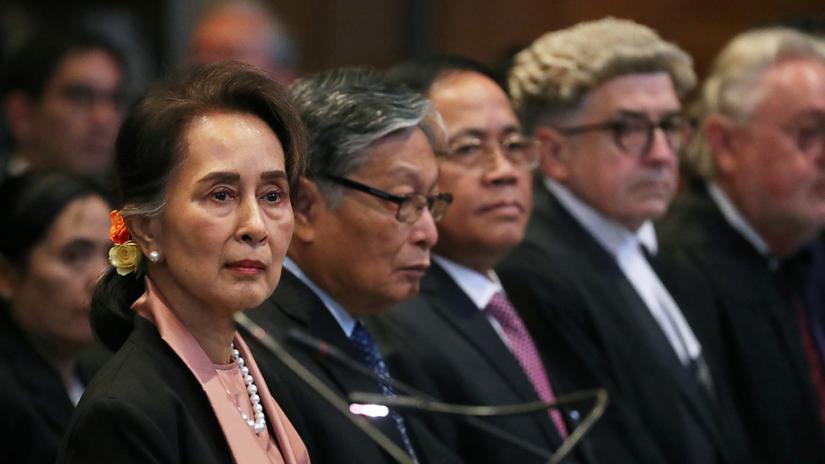 The Gambia or in some ways Bangladesh has taken not only Myanmar, but also Nobel Laureate Aung San Suu Kyi to the International Court of Justice (ICJ) for Rohingya persecution in a very calculated manner predicated on the fact that all the states were parties to the 1948 Genocide Convention.
The Gambia or in some ways Bangladesh has taken not only Myanmar, but also Nobel Laureate Aung San Suu Kyi to the International Court of Justice (ICJ) for Rohingya persecution in a very calculated manner predicated on the fact that all the states were parties to the 1948 Genocide Convention.
Gambia asserted that the prohibition of genocide is a jus cogens norm, and results in obligations erga omnes and erga omnes partes, leading to the filing of the application. This is significant as it seeks to cover both bases – the obligations that arise towards the international community as a whole, as well as to parties to the convention.
The case against Myanmar, filed by The Gambia, was indeed the result of Prime Minister Sheikh Hasina’s diplomacy and statesmanship when she attended the Organisation of Islamic Cooperation (OIC) summit earlier this year. The Gambia is a member of the Islamic group and was acting on behalf of the Muslim world and Bangladesh was not made a party to the case for tactical reasons.
Thus in some ways one could conclude that it was Sheikh Hasina who has taken Suu Kyi to the court in a case where Bangladesh opened its borders on humanitarian grounds for the fleeing Rohingyas.
While exchanging his views with this authour, Foreign Minister Minister Dr AKM Abdul Momen, appeared to be pleased on the content of the case presented by The Gambia.
“I am so sad to see this day when Suu Kyi is defending a genocide case as I also demonstrated for her freedom because she was an icon of human rights,” Momen said on a note of regret.
In a strange reversal of roles, the lady who once championed human rights listened quietly as Abubacarr Tambadou, Justice Minister of the Gambia, presented his country’s case against Myanmar at the ICJ. Suu Kyi was under focus for all the wrong reasons this time -------from having been the iconic champion of human rights to becoming the defender of a genocide which was beyond any doubt.
She fought from jail for 15 years against the military junta of Myanmar and this time she was defending them by using her international reputation as a Nobel Laureate.

If the Court gives any direction that accepts that the Gambian genocide case as proven and both short and long time measures might have to be taken, then Suu Kyi, the 1991 Nobel Peace Prize Winner, would herself be in the court of people hurt by human rights violations.
From The Hague any direction given by the ICJ would have to be approved by the Security Council. Except for China, none would veto the move. Even China might take a tactical move having made huge investments in Bangladesh and maintaining warm ties with Prime Minister Sheikh Hasina.
The Gambia is seeking emergency measures to prevent further assaults on the Rohingyas pending a wider case at the ICJ which could take years to end, but will have far-reaching impact against the Myanmar government.
Rights groups and other credible organisations have confirmed that a genocide was committed by the Myanmarese soldiers, but the regime in the Buddhist-majority country, which was indeed very unpredictable, have repeatedly denied saying their action was against insurgents.
How Aung San Suu Kyi could agree to defend such a version being a Noble Laureate was a million-dollar question.
Whether the Noble Committee will withdraw her 1991 Noble Peace Prize remains to be seen and most likely it would be based on how she defended her country in the face of allegations of genocide to uproot minority Muslim Rohingyas.
The US Holocaust Memorial Museum last year revoked its Eli Wiesel award given to Suu Kyi.
What was more embarrassing for Suu Kyi was that a large number of her fellow laureates issued a joint statement saying “We are deeply concerned that instead of condemning these crimes, Aung San Suu Kyi is actively denying that these atrocities even occurred” and demanded that their fellow peace laureate be criminally held accountable along with the army generals for the crimes committed.
“As people of peace, we urge Aung San Suu Kyi to address the systemic discrimination in Rakhine State, and ensure the Rohingya’s right to nationality, land ownership, freedom of movement and other fundamental rights,” they said.
On Nov 11, 2019, The Gambia filed an application at the International Court of Justice against Myanmar, alleging violation of obligations under the Genocide Convention. On methodology, the application relies heavily on the 2018 and 2019 reports of the Independent International Fact-Finding Mission on Myanmar (FFM) for much of the factual basis of the assertions – placing emphasis on the conclusions of the FFM in regard to the question of genocide.
For the legal basis of the application, The Gambia asserted that both states are parties to the Genocide Convention, neither have reservations to Article IX, and that there existed a dispute between it and Myanmar – listing a number of instances in which Gambia has issued statements about and to Myanmar regarding the treatment of the Rohingyas. The Gambia asserts that the prohibition of genocide is a jus cogens norm, and results in obligations erga omnes and erga omnes partes, leading to the filing of the application. This is significant as it seeks to cover both bases – that the obligations arise towards the international community as a whole, as well as to parties to the convention.
Bangladesh Army Chief General Aziz Ahmed toured the Rohingya camps in southeastern Cox’s Bazar several times before he undertook his journey to the neighbouring country.
This was a new channel of negotiation and he very rightly raised the issues that concerned Bangladesh in its ties with Myanmar.
The army troops last month started to put up barbed-wire fence around the areas where more than 1.2 million Rohingyas, who fled their homes in the face of persecution, were sheltered.
This authour had repeatedly backed the barbed-wire fencing as it was an important step to restrict the movement of those Rohingyas involved in criminal activities like drug smuggling and prostitution.
The landmark hearing in the ICJ was expected to end with a very serious directive that would not only stop the Myanamarese authorities from carrying out atrocities against the Rohingyas and deter any such future acts by any other country.
What remains to be seen was how Aung San Suu Kyi comes out of the hearing and if she finally loses her 1991 Noble Peace Prize.
Nadeem Qadir is the Consulting Editor, Daily Sun and a UN Dag Hammarskjöld fellow.


